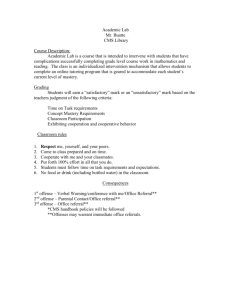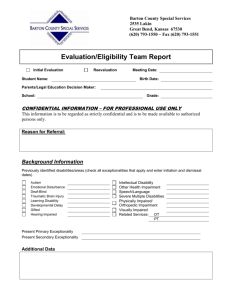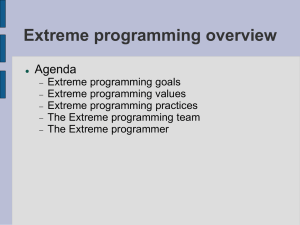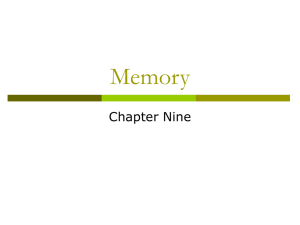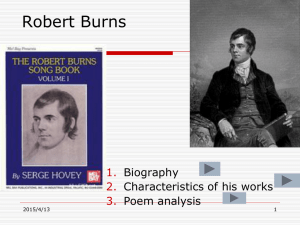Reading Intervention: Incremental Rehearsal
advertisement
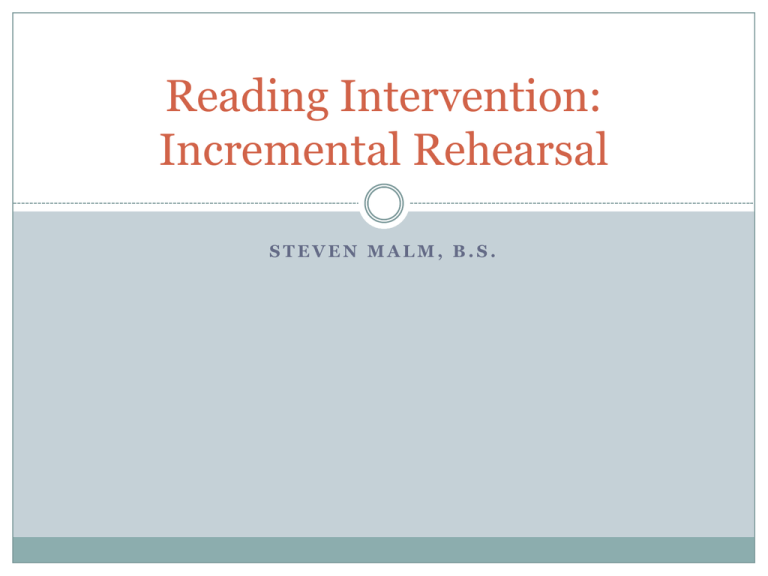
Reading Intervention: Incremental Rehearsal STEVEN MALM, B.S. The Case Subject: Alan – 5 year old Caucasian male Grade: Kindergarten Reason for Referral: Alan cannot identify or name letters of the alphabet. Baseline assessment suggests that Alan has mastery of… 5 upper-case letters (A, B, C, D, E) 3 lower-case letters (A, C, E) Mastery defined as ability to correctly name letter with 80% accuracy (4 out of 5). Goal of Intervention At the end of the intervention, Alan will be able to name all 26 upper-case and all 26 lower-case letters Intervention duration: 3 weeks Intervention frequency: 5 days/week, 15 minutes Ambitious goal: 10 upper- and lower-case letters mastered/week (20 per week) Realistic goal: 8 upper- and lower-case letters mastered/week (16 per week) Intervention Plan Intervention Name: Incremental Rehearsal (Burns, 2005) Overview: Student is presented with flashcards containing some unknown letters with a group of mastered letters. Presenting mastered letters alongside unknown letters can increase retention. Materials needed: Letter flashcards (all 52 upper- and lower-case letters) Sheet of paper Pencil The Process Start point: 8 mastered vs. 1 unknown A, B, C, D, E a, b, c, e First 10 minutes: Direct Instruction Show Alan the first unknown card and have him attempt to identify the letter, providing feedback as necessary Show Alan the first mastered care and have him identify the letter Show Alan original unknown card and have him attempt to identify the letter The Process (Cont.) Follow this sequence: Unknown, mastered Unknown, mastered, mastered Unknown, mastered, mastered, mastered Unknown, mastered, mastered, mastered, mastered Etc. until child names the Unknown correctly twice in a row. Add that letter to the mastered pile and select a new letter from the unknown pile Start sequence with new unknown letter The Process (Cont.) Last 5 minutes: Mastery Assessment Shuffle all cards used during direct instruction Have Alan name each letter as they are presented Record letters read correctly/incorrectly on sheet of paper Repeat for a total of 5x Unknowns presented during direct instruction that are identified correctly 4 out of the 5 trials are considered mastered. Letters considered incorrect if it takes >2 seconds to name Letters not named at 80% accuracy are returned to the unknown pile for the next day Record number of letters read correctly Make sure you also keep track of which letters are read Baseline Procedures Baseline was established using same mastery assessment outlined in previous slide. Assessed upper- and lower-case separately. Upper case letters presented 5 times per day for 3 days Lower case letters presented 5 times per day for 3 days The number of letters named with 80% accuracy were recorded Upper- and lower-case letters charted separately. Also recorded letters that were named correctly to establish mastered letter list Baseline level determined by the mean of the three points Progress Monitoring Procedures Progress monitoring will be continuous Each day, Alan will complete the Mastery Assessment at the latter half of the intervention. The interventionist is to record all letters named with 80% accuracy Record this number on the progress-monitoring chart. There will be a maximum of 15 data points for progress monitoring (5 days/per week for 3 weeks). Progress monitoring data will be evaluated at the end of the first week (5 points) to determine if the intervention is effective. Support for Intervention Burns (2005) Incremental Rehearsal is useful for many different skills (letter recognition, simple math facts, vocabulary words, etc.) Bunn, Burns, Hoffman, Newman (2005) Case study using Incremental Rehearsal to teach letter recognition to 4-year old student. Intervention went for 15 minutes every day for 3 weeks. Child successfully could name every letter of the alphabet within 2 seconds of visual presentation Results suggests that Incremental Rehearsal is a fast and easy-to-use intervention for letter naming Burns & Sterling-Turner (2010) Incremental Rehearsal is highly effective when it comes to information retention References Bunn, R., Burns, M.K., Hoffman, H.H., & Newman, C.L. (2005). Using incremental rehearsal to teach letter identification to a preschool-age child. Journal of Evidence-Based Practices for Schools, 6(2), 124-133. Burns, M.K. (2005). Using incremental rehearsal to increase fluency of single-digit multiplication facts with children identified as learning disabled in mathematics computation. Education and Treatment of Children, 28, 237-249. Burns, M.K. & Sterling-Turner, H.E. (2010). Comparison of efficiency measures for academic interventions based on acquisition and maintenance. Psychology in the Schools, 47(2), 126-134. DOI: 10.1002/pits.20458

